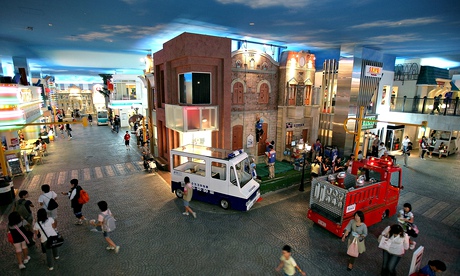
My eldest son, aged seven, is examining a crime scene with his new colleagues. A stolen wallet has been found, and they must trace the owner. The mood is solemn, intense.
Meanwhile, across the street, my youngest, aged four, is busy making pizza. He is bursting with can-do pride, but trying to look as though he does this kind of thing every day.
We are in KidZania Tokyo, one of 16 branches of the fast-expanding global theme park chain: a two-thirds-scale indoor town, with fake sky, fake streets and fake buildings housing 70 shops, restaurants and businesses – from pizza parlours to police stations; there’s even the fuselage of a Boeing 737 for budding cabin crew – all staffed by the thousands of children aged four to 15 who visit each day.
The idea behind KidZania is that children will experience the world of work via role play with adult “zupervisors” – parents are excluded from the town – teaching lessons about responsibility, decision-making and teamwork. Since the first one opened in Santa Fe, near Mexico City, in 1999, more than 35 million children have visited branches of KidZania in cities from Mumbai to Seoul. Early next year, the first branch in the UK is due to open in west London, at Westfield in Shepherd’s Bush, and the company predicts a million people a year will visit.
On entering KidZania, children are given radio-frequency tags – so they can’t leave without an alarm going off – and handed 50 kidzos – KidZania’s currency. These they can deposit in the KidZania bank, which is staffed by children of course and offers 10% interest – to retrieve later using bank cards at pretend ATMs. Or they can spend it on souvenirs and junk food. They can then earn more by working – between five and eight kidzos for a 25-minute shift, depending on the job.
The Japanese branch is rather earnest. I am not getting strong “play” vibes from many of the children. “There is no baby-talk here,” a spokesman tells me. “And in KidZania you will notice it is always dusk, because dusk is when kids have to go home, so it adds an exciting air.”
A fire engine blares past on its way to a fake fire. Fireman is one of the most popular professions in KidZania, along with cabin crew and police officer. The fully equipped TV studio always has big queues, too, as, more perplexingly, does the car-rental office.
I was sceptical when I heard about KidZania: why not let kids be kids? Lord knows there’s plenty of time in one’s life for the rigours and restrictions of the workplace. Also, the London version will be heavy on corporate sponsorship: companies such as DHL, Renault and H&M have signed on for brainwashi… sorry, sponsorship deals.
The first KidZania, in Mexico, is apparently more relaxed than the Japanese version, and secretly I hope British children will find ways to subvert the project (an Occupy movement, perhaps?), but the waiting times of up to an hour on the day we visited the Tokyo branch testified to the enthusiasm of KidZania’s citizens there, if nothing else.
“There is a KidZania newspaper. Would you like to be a journalist like Daddy?” the spokesman asks my eldest. “Yes!” I jump in. “What about trying Daddy’s job for a bit – see how tough it really is?” My son pulls a face.
“Hmm,” says the spokesman. “I have to say we have found that to be one of the least popular jobs…”
KidZania London prices and opening date to be confirmed
• Michael Booth’s book, Sushi and Beyond, is published by Vintage (£9.99). To order a copy for £8.49, including UK p&p, visit bookshop.guardian.co.uk or call 0330 333 6846

